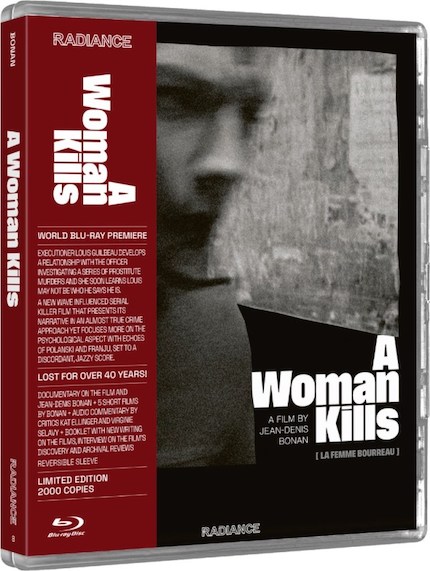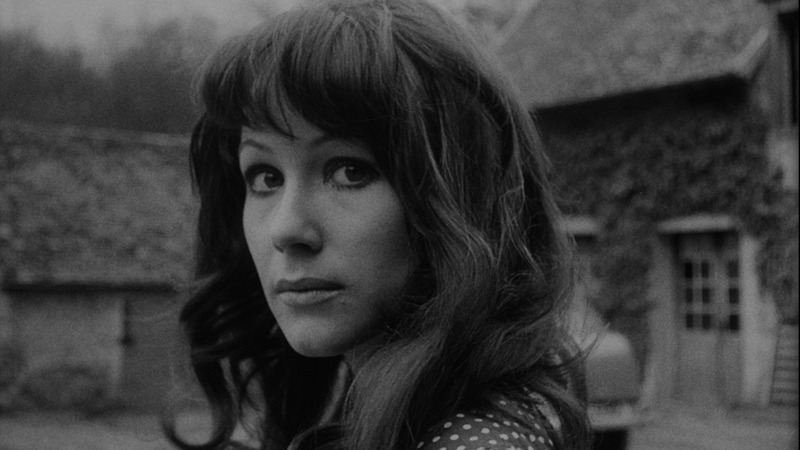A WOMAN KILLS Review: Daring, Sexual, Violent, French Classic
Now on Blu-ray from Radiance.

Unavailable to many for nearly half a century, French-Tunisian born writer-director Jean-Denis Bonan’s first and only narrative feature, A Woman Kills (La femme bourreau) has arrived on Blu-ray.
This monochrome murderous mind-bender, made for beans, generates its share of gut-churning discomfort. An experimental cacophony of sex and sexualized killing (though not always in that order), Bonan’s film is nothing if not uncompromising. Which fully tracks, considering that there’s a major unseen revolution happening off frame and several blocks over during A Woman Kills.
Welcome to Paris in May of 1968. It’s not a scripted setting or an intentional plant, a la Haskell Wexler’s Medium Cool. This is where and when A Woman Kills found itself in production. And ever the social crusader, Bonan (spurred on by no less than Jean-Luc Godard) embraced the opportunity to envelop his narrative in such upheaval. While no visual or verbal indication is given about the protests, the formal result leaves little doubt of the strife in the air.
A gene-spliced urban cauldron of social and mental turbulance, film’s intensely visually non-diegetic nature (yes, it makes that a thing) takes us into the minds and perceptions of A Woman Kills’ two main characters, Louis (Claude Merlin) and Solange (Solange Pradel). Despite the arrest and execution of whom was thought to be a feared serial murderer, doubt has crept in. What if the authorities got the wrong person? And sure enough, the doubt is warranted. Identities and reality warp as the walls of truth close in. Into this house they’re born; into this world they’re thrown.
Set to wild music cues by Bernard Vitet, and editing that plays up a kind of architectural cage-scape, A Woman Kills circles its mark in the viewers memory days after the initial experience. A hauntingly progressive piece, its title proves fluid in applicability to at least three characters. As Solange walks the street by night, it is menacingly clear to us that the wild-eyed transvestite passing her by is none other than Louis. “There’s a killer on the road… His brain is squirmin’ like a toad…”.
It’s generally unexplained how the film’s frequent unconventional nude depictions of Solange as well as the methodical undressing of several killed call girls adds up to a killing spree, but what we do get it is quite the jolting soul-baring monologue at the end. Psycho, it is not, nor is it traveling murderer Billy Cook, or whomever else.
Still, a chauvinistic warning echoes, and it can’t be gotten rid of: Girl, you gotta love your man / Take him by the hand / Make him understand / The world on you depends / Our life will never end / Gotta love your man, yeah…. Such a thin line between love and murder…
British upstart label Radiance continues its bold and impressive jump into the disc collector’s market with this limited-edition Blu-ray release of A Woman Kills. Commercially, this rediscovered edgy classic is the wildest of wild cards, something that is at once like cinematic manna but also an obvious sales risk for its lack of previous exposure.
Nevertheless, Radiance has done extremely right by this film, presenting it on Blu-ray with its image sourced 2K restoration of the film from the original 16mm elements, and featuring original uncompressed mono PCM audio. Suffice to say, A Woman Kills looks and sounds magnificent, delivering the right kind of tactile and gritty satisfaction. Also, there’s a terrific essay booklet.
Tops on the disc’s special features menu is a new audio commentary by critics Kat Ellinger and Virginie Sélavy. For the most part, Ellinger is interviewing/prompting Sélavy, though both get to share and interject plenty of astute observations. Ellinger, one of the preeminent experts on the career of Bonan cohort Jean Rollin, wastes no time evoking the latter filmmaker. The working crossover was strong; the directors assisted on one another’s projects and even utilized some of the same actors. A Woman Kills was made around the same time as Rollin’s horror breakthrough, Rape of the Vampire (1968). Both films feature the enigmatic Solange Pradel.
Film critic Virginie Sélavy offers up a stately optional introduction to the film, laying helpful groundwork. More in-depth (in that it’s not an introduction but a bona-fide interview short) is On the Margin: The Cursed Films of Jean-Denis Bonan (Francis Lecomte, 2015/2022, 37 mins). It is described by Radiance as “a newly updated documentary featuring director Jean-Denis Bonan, cinematographer Gérard de Battista, editor Mireille Abramovici, musician Daniel Laloux, and actress Jackie Rynal.”
What that doesn’t tell you is that it’s very much a talking heads piece, mostly with Bonan, and with less b-roll than one might expect. It is, however, tremendously informative, and from the horse’s mouth, so to speak. The bonus menu also provides A Woman Kills’ trailer. The outer sleeve art is reversible, featuring original and newly commissioned artwork by maarko phntm.
It’s always fantastic when a filmmaker’s short film work is made available, particularly that of a director who we’re only now becoming acquainted with. Radiance has seen fit to include five such titles, all preceding the production of A Woman Kills. One of them is an incomplete assembly of fragments and clips. Here’s the detailed rundown of the shorts:
The Short Life of Monsieur Meucieu (1962, 13 minutes) is an amateur experimental piece included, no doubt, in the interest of closer completion and a claim that it forecasts formal accomplishments seen in A Woman Kills. There’s an immediate proclamation that “the world is not upside-down!” To that I say, you just wait, good sir! It’s only 1962; the decade won’t get any easier. Still, the character repeats, “Bad things always happen in life!” Yes, they do.
A Crime of Love (1965, rushes). Seven minutes of footage that was shot of a handful of actors dramatizing the gambled-away fate of the farmer’s daughter. While not too engaging, even with the filmmaker doing his best to narrate what he remembers of the unfinished project, I suppose that this will be of some interest to any aspiring Bonan completists out there.
Things take a turn in every way with The Sadness of the Anthropophagi (1966, 24 minutes). While this short maintains the oblique and conceptual strangeness of the earlier efforts, it ups the aesthetic ante with some of engrossing black and while cinematography and go-for-broke performances and blocking. The concept alone, involving a restaurant that serves fresh human feces to wealthy clientele (social commentary, you see), earned the ire of France, resulting in it being banned.
If it’s possible for a director to go entirely too camera crazy, but in a digestible way, Bonan’s Crazy Mathieu(1967) might be the ideal example. Without plummeting into pure “Bayhem,” Bonan thrusts his camera into overbearingly expressive positions. Consequently, the actors are shortchanged in ways Hitchcock himself could only fantasize about.
Part of it might be that Bonan doesn’t have great faith in himself as the lead actor. Another might be the threadbare story itself, in which A Woman Kills lead, Solange Pradel, finds herself pined for by many but tethered to an abuser she wishes were dead. In only 17 minutes, Bonan stretches this premise to the tolerable extremes of forced experimentation.
A Season with Mankind (1967) is a somber 19-minute excursion into well-assembled turbulent news footage. While A Season with Mankind’s existence predates the May ‘68 turbulence for which Bonan is associated, there’s a particular prophetic air about the tone and bleak narration of this short. Intended as a tribute to the filmmaker’s many fellow acquaintances in the news-film hustle (including Jean Rollin), this film, in its subjectivizing what is intended to be objective, lays clear Bonan’s own worldview.
For adventurous, dyed-in-the-wool film buffs, it is the kind of film that’s exciting to watch and exciting to get to watch. For this Blu-ray critic, new to Radiance with this release, the label has minted a new fan.
A Woman Killsis an imperfectly male-energized film that dares to go into a few new directions, both formally and socially, and demands to be seen. Armed with this understanding and an appetite for discovery of the past, this living relic of May ‘68 pulses anew with uneasy vigor.
A Woman Kills
Director(s)
- Jean-Denis Bonan
Writer(s)
- Jean-Denis Bonan
Cast
- Claude Merlin
- Solange Pradel
- Myriam Mézières








